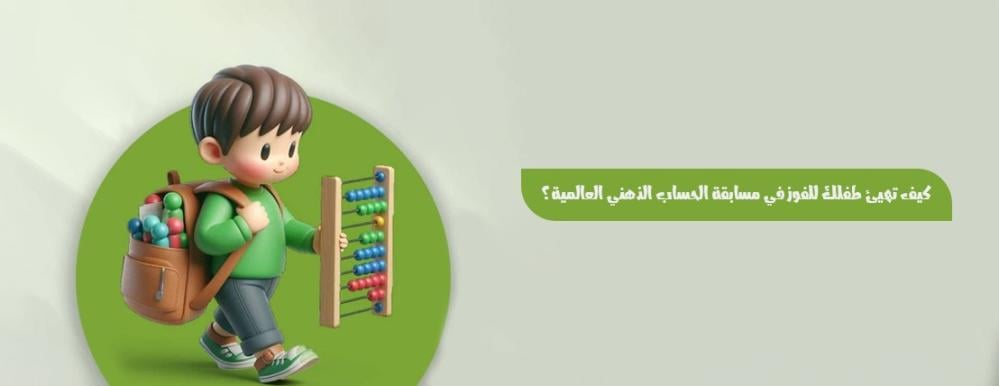
How to Prepare Your Child to Win the World Mental Math Competition
Mental math competitions are among the most effective ways to develop children’s cognitive abilities, enhance quick thinking, and improve focus and attention. Winning at these global competitions requires more than just natural talent; it demands regular competition training, motivational strategies, and systematic preparation.
In this article, we’ll guide you step by step on how to prepare your child, with practical steps, training strategies, and tips for parents to support their children both mentally and emotionally.
1. Understanding Mental Math Competitions
Before starting training, it’s important for both children and parents to understand the nature of the competition:
What is a mental math competition?
A challenge where children perform arithmetic operations quickly and accurately, often without using paper, pencils, or calculators, focusing on addition, subtraction, multiplication, division, and sometimes roots.
Importance of the competition:
- Develops fast and logical thinking.
- Enhances visual and auditory memory.
- Improves ability to perform under time pressure.
Objectives of the competition:
- Sharpen mental calculation skills.
- Train concentration and attention for extended periods.
- Build self-confidence through positive competition.
2. Steps to Prepare for Competitions
Good preparation is half the success. Key steps include:
1. Create an organized training schedule
- Set aside daily time for practicing different arithmetic operations.
- Divide the schedule into short sessions (20–30 minutes) instead of long sessions to avoid mental fatigue.
Example Schedule:
Saturday
Fast addition & subtraction
20 min
Sunday
Multiplication & roots
25 min
Monday
Review exercises
30 min
2. Start with the basics before moving to advanced levels
- Ensure the child masters basic operations before progressing.
- Use flashcards or interactive apps to reinforce concepts in a fun way.
3. Practice competition-style drills
- Introduce time-bound challenges similar to actual competitions.
- Use past test papers or simulated global competition questions.
- Goal: adapt to time pressure and improve calculation speed.
4. Diversify training methods
- Educational games: interactive apps, digital puzzles, or small local competitions.
- Group training: practice with friends or siblings to build healthy competitive spirit.
- Memory techniques: use counting aloud, flashcards, or number-story associations.
3. Psychological Preparation
Winning depends not only on math skills but also on mental readiness.
1. Build self-confidence
- Praise effort, not just results.
- Offer small rewards for achieving daily training goals.
2. Reduce stress and anxiety
- Teach deep-breathing techniques before training sessions or tests.
- Schedule regular breaks for relaxation.
3. Encourage intrinsic motivation
- Talk about learning and personal growth, not only winning.
- Explain that every training or competition experience enhances skills.
4. Effective Tools and Techniques for Training
1. Educational apps
- Abacus Mental Math: practical exercises for fast calculations using the abacus.
- Math Brain Trainer: diverse exercises to improve speed and accuracy.
2. Interactive games and activities
- Home competitions between siblings or friends.
- Use number cards or board games to practice arithmetic in a fun way.
3. Specialized trainers
- Enroll in mental math courses at specialized centers like Gel Alpha Center.
- Training with a professional coach corrects mistakes and strengthens focus.
5. Integrate Training into Daily Life
- Encourage calculations while shopping or traveling.
- Link math problems to real-life stories or scenarios to reinforce memory.
- Use a home board for short family challenges to promote positive competition.
6. Common Mistakes to Avoid
- Excessive pressure: keep training fun; short, varied sessions work best.
- Neglecting rest: the brain needs short breaks to recharge.
- Comparing with others: focus on your child’s personal progress.
- Rushing to advanced levels: ensure mastery of basic skills first.
7. Parental Tips
- Participate in daily training in a supportive way.
- Create a positive, motivating home environment.
- Monitor progress with a professional trainer.
- Reward small achievements to boost motivation.
8. Pre-Competition Preparation
- Simulate official environment: practice under timed conditions.
- Review all basic concepts: focus on addition, subtraction, multiplication, division, and advanced operations as appropriate.
- Regular performance evaluation: use flashcards or weekly test sheets to measure improvement.
- Boost mental resilience: teach that success and failure are learning opportunities.
9. Inspirational Success Stories
- Ali, 10 years old: Trained with a specialized coach; after 6 months, won a local competition and gained confidence.
- Laila, 8 years old: Enrolled at Alpha Generation Center; solved 50 mental math problems in 5 minutes, qualifying for the global children’s competition.
These examples show that structured preparation, consistent training, and emotional support make the difference between mere participation and winning.
Conclusion
Winning the world mental math competition requires:
- Understanding the competition and its requirements.
- Following an organized training schedule covering all operations.
- Practicing competition-style drills to improve speed and accuracy.
- Supporting the child psychologically to build confidence and reduce anxiety.
- Using diverse educational tools: apps, games, and specialized trainers.
- Integrating training into daily life for skill reinforcement.
With these steps, every child can be ready to compete globally, win with mental agility, and develop a love for learning.

